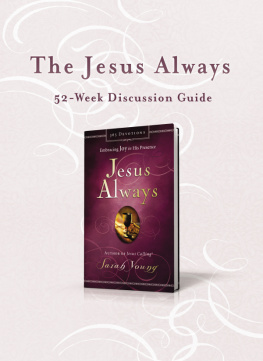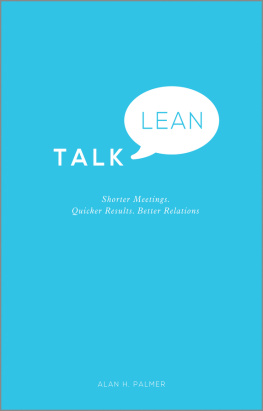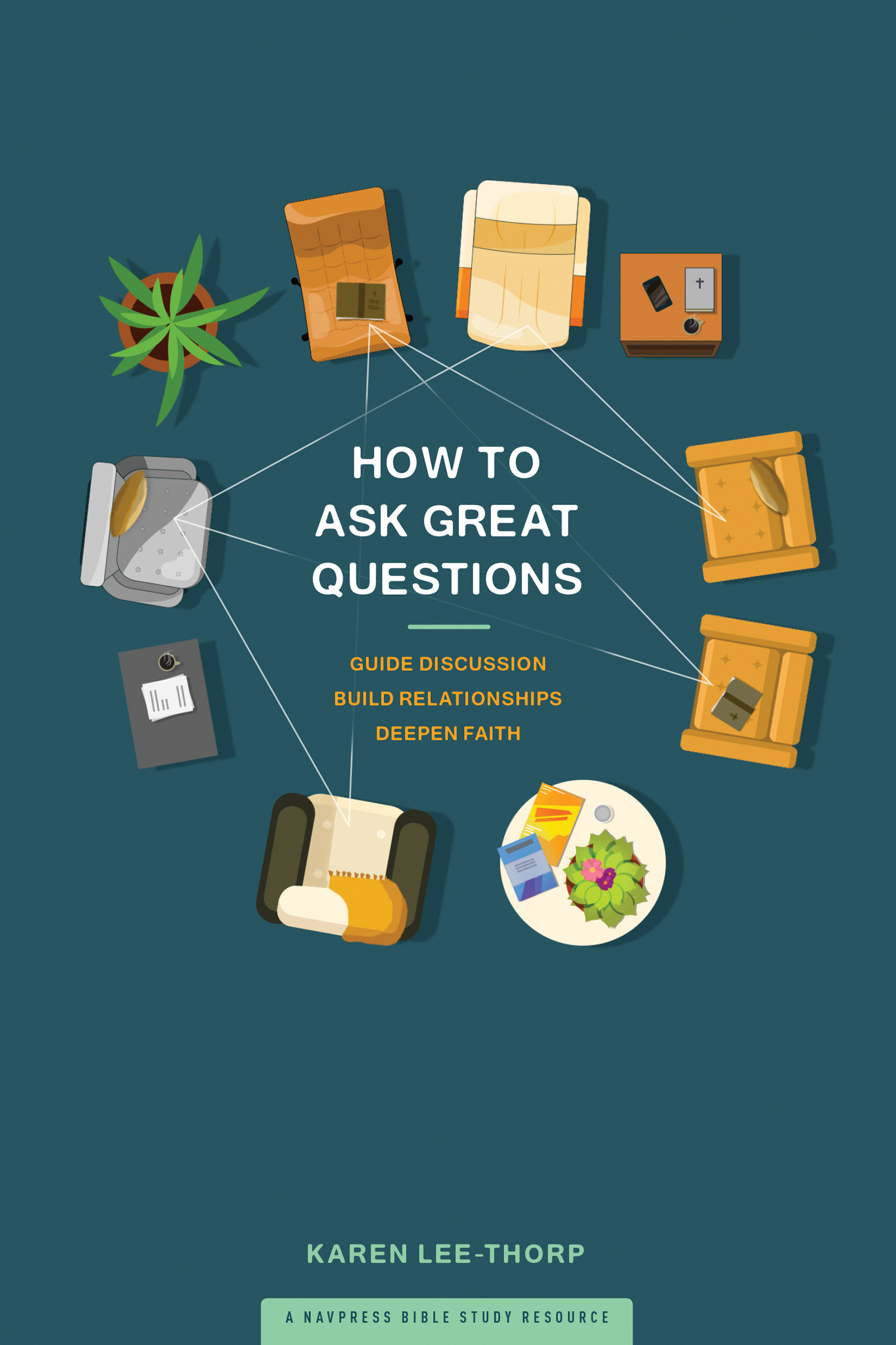NavPress is the publishing ministry of The Navigators, an international Christian organization and leader in personal spiritual development. NavPress is committed to helping people grow spiritually and enjoy lives of meaning and hope through personal and group resources that are biblically rooted, culturally relevant, and highly practical.
For more information, visit www.NavPress.com.
How to Ask Great Questions: Guide Discussion, Build Relationships, Deepen Faith
Copyright 1998 by Karen Lee-Thorp. All rights reserved.
A NavPress resource published in alliance with Tyndale House Publishers, Inc.
NAVPRESS is a registered trademark of NavPress, The Navigators, Colorado Springs, CO. The NAVPRESS logo is a trademark of NavPress, The Navigators. TYNDALE is a registered trademark of Tyndale House Publishers, Inc. Absence of in connection with marks of NavPress or other parties does not indicate an absence of registration of those marks.
The Team:
Don Pape, Publisher
David Zimmerman, Editor
Elizabeth Symm, Copy Editor
Jennifer Ghionzoli, Designer
Cover illustrations of round table and cream chair copyright by robuart/Creative Market. All rights reserved.
Cover illustrations of brown table and chairs copyright by Onyx/Creative Market. All rights reserved.
Cover illustrations of stuffed chairs and gray table copyright by volyk/Creative Market. All rights reserved.
All Scripture quotations, unless otherwise indicated, are taken from the Holy Bible, New International Version, NIV. Copyright 1973, 1978, 1984, 2011 by Biblica, Inc. Used by permission. All rights reserved worldwide. Scripture quotations marked NRSV are taken from the New Revised Standard Version Bible, copyright 1989, Division of Christian Education of the National Council of the Churches of Christ in the United States of America. Used by permission. All rights reserved.
Some of the anecdotal illustrations in this book are true to life and are included with the permission of the persons involved. All other illustrations are composites of real situations, and any resemblance to people living or dead is purely coincidental.
For information about special discounts for bulk purchases, please contact Tyndale House Publishers at , or call 1-800-323-9400.
Cataloging-in-Publication Data is available.
ISBN 978-1-64158-132-5
ISBN 978-1-64158-106-6 (ePub); ISBN 978-1-64158-105-9 (Kindle); ISBN 978-1-64158-104-2 (Apple)
Build: 2021-04-21 15:18:09 EPUB 3.0
WHAT THIS BOOK IS ABOUT
The Power of a Good Question
Once when Jesus was praying in private and his disciples were with him, he asked them, Who do the crowds say I am?
They replied, Some say John the Baptist; others say Elijah; and still others, that one of the prophets of long ago has come back to life.
But what about you? he asked. Who do you say I am?
Peter answered, Gods Messiah.
LUKE 9:18-20
JESUS WAS A BRILLIANT TEACHER. He knew how to tell a story that would propel people into thinking in new categories. He was king of the one-liner. And He understood the power of a well-timed, well-phrased question.
- Who do the crowds say I am? (Luke 9:18)
- Do you want to get well? (John 5:6)
- What do you think about the Messiah? Whose son is he? (Matthew 22:42)
- What do you want me to do for you? (Luke 18:41)
- Which of the two did what his father wanted? (Matthew 21:31)
Jesus questions were simple, clear, never condescending, always provocative. They made people think for themselves and examine their hearts. Jesus questions were always fresh and attuned to the unique needs of the people He was talking to. Instead of following a rote method, He seems to have thought about how His questions would affect His audience.
Research tells us that people remember far more of what they say than what they hear, and far more of what they discover for themselves than what they are spoon-fed. Hence, a question that sparks discovery and gets people to say out loud what they know is an essential tool in teaching. And in a small group, the question is everything.
This book will equip you to ask questions that
- build relationships between people
- help people analyze a passage of the Bible or another book
- draw out opinions and feelings
- follow up on a primary question
- guide people in applying the Bible to their unique lives
- guide a group in solving a problem or reaching a decision
You will find this book useful if you
- lead a small group
- teach Sunday school
- teach in any interactive learning environment
- chair a group or committee that makes decisions
The table of contents is annotated so you can investigate just the topic you are looking for, or you can read cover to cover. Some sections will refer you to other sections for more on a related topic.
KARENS TOP TEN PRINCIPLES FOR ASKING GREAT QUESTIONS
First, a few general principles.
1. This is a discussion, not a test.
A test is a situation in which the person asking the questions knows all the right answers, and the responders task is to give the right answers. Test questions are fine in high-school algebra class or in the oral exam for a doctoral candidate. Test questions are useful when your goal is to see if people can parrot back information they have memorized, such as in a foreign-language class. However, when either spiritual growth or sharing among peers is a goal of your group, test questions can cause problems.
For one thing, tests tend to put people on the defensive they worry about giving the wrong answer and appearing foolish, so their pulse rises and adrenaline flows. Adrenaline is good for those running marathons, but it hinders creative thinking. In fact, it actually floods out those portions of the brain in which people do creative thinking.
By contrast, a relaxed but stimulating environment, one in which people feel welcomed and engaged, is the kind most likely to encourage people to consider new ideas, examine their lives, and entertain the possibility of changing their behavior.
Second, tests imply a hierarchy. The teacher has the right answers and so is superior to the students. In a class on prayer, it may be true that the teacher knows more about prayer than the students do. The teacher may impart some of his or her knowledge to the students. But when the teacher asks a question about prayer, it needs to be very clear in everyones mind whether the teacher wants the class to think for themselves or repeat something the teacher has said. A test question is okay if everyone understands they are reviewing material they have heard before, but when a test question is disguised as a discussion question, people feel put down. A group designed for spiritual growth requires shared power and an atmosphere of mutual respect. Test questions disguised as discussion questions dont feel respectful.














